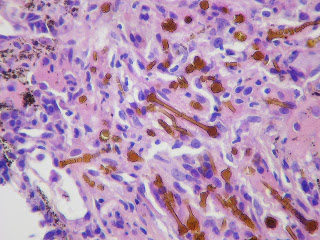 |
| Mesothelioma of the Peritoneum |
Mesothelioma of the Peritoneum. The peritoneum is a membrane lining the cavity of the abdomen and covering the abdominal organs. The parietal layer protects the abdominal cavity, while the visceral layer encompasses abdominal areas. Collectively these two layers offer protection for abdominal organs.
There are two main notions regarding how asbestos exposure leads to the growth of peritoneal mesothelioma:
First: Asbestos fibers are consumed, and these materials make their way from digestive organs into the peritoneal membrane.
Two: Asbestos fibers are breathed in, and journey to the peritoneal membrane through the lymphatic system.
No matter how asbestos fibers really enter the peritoneal layers, as soon as they do get into the membrane, the body encounters problems in getting them out of the body. The fibers come to be stuck in the peritoneal membrane, and over a interval of two or more decades, lead to specific variations in the mesothelial cells of the peritoneum.
The precise way in which asbestos materials induce modifications in these mesothelial cells is unclear. Nevertheless, some scientists think asbestos fibers induce long-term swelling and discomfort that gradually leads to mesothelial cells becoming cancerous. Cancerous mesothelial cells split and expand without constraint, and this out of control cell development leads to thickening of the peritoneum, and the establishing of liquid in the peritoneal layers.
Peritoneal Mesothelioma Indicators
A person with peritoneal mesothelioma might not show signs of the cancer for years following original asbestos exposure due to the fact it frequently takes years for mesothelioma to show itself. In the case of peritoneal mesothelioma, asbestos fibers journey into the peritoneal layers where they cause irritation and inflammation and the development of cancerous cells which divide and grow uncontrollably. The cells cause thickening of the peritoneum and fluid build-up in the peritoneal layers. As the cancerous cells continue to split, cancer begins to form. Most peritoneal mesothelioma indications are triggered by this membrane thickening, liquid build-up, and ultimate tumor growth - all of which place stress on internal organs.
Peritoneal mesothelioma signs
1. Abdominal ache or inflammation
2. Changes in intestinal routines (Irregular bowel movements)
3. Growth of lumps below the skin on the abdomen
4. Night sweats or fever
5. Inexplicable weight reduction
6. Nausea or vomiting
7. Tiredness
Read more: What is Mesothelioma and How is it Caused.
*The above information is very general in nature and should not be considered or relied upon as legal advice or medical advice. If a reader has a legal or medical problem immediately consult an attorney or medical professional for specific legal and or medical advice. See the disclaimer at the bottom of the page for more information.
Photo credit
No comments:
Post a Comment